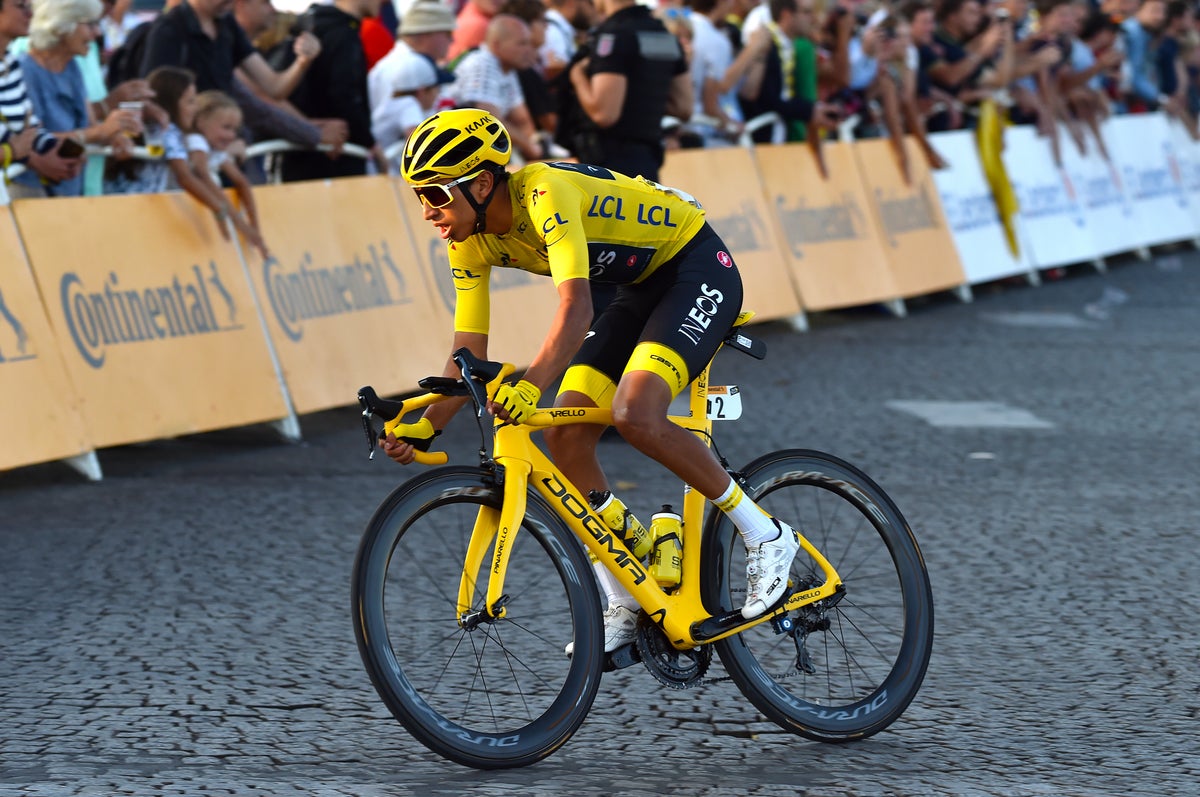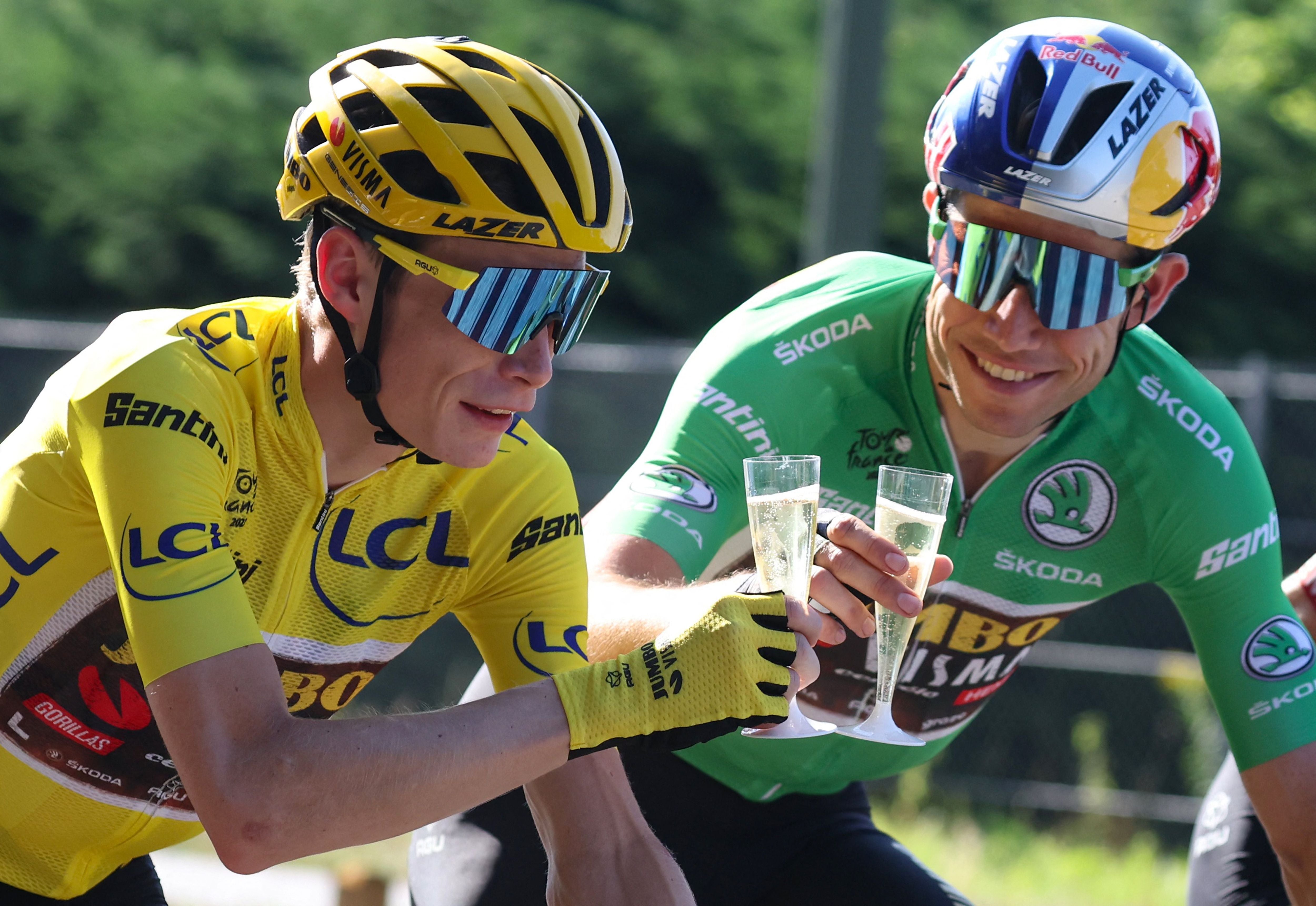
As the luminous yellow figure of Jonas Vingegaard rolled down the start ramp of the stage 20 time trial in Lacapelle-Marival, en route to sealing his first Tour de France crown, 500 miles north the world champion Julian Alaphilippe was hauling up Belgium’s famous Mur de Huy.
At the top of this steep road, Alaphilippe crossed the line and raised a fist in celebration. He had won the first stage of the Tour de Wallonie, and perhaps more importantly he had shown to himself and the wider world that he was back. Alaphilippe was one of the unlucky victims of a domino-crash in the peloton during April’s Liege-Bastogne-Liege, falling into a ditch where he broke two ribs, a kneecap and suffered a collapsed lung. Yet less than three months later, here he was winning again.
It was a fleeting reminder that there were still some elements missing from this year’s relentlessly entertaining Tour. Alaphilippe lit up the 2019 edition, carrying the yellow jersey for two weeks to the delight of home fans, and his compelling persona – rocking out of his seat, tongue out – ignited a French passion for cycling that had laid dormant through so many underwhelming years.
The 2022 Tour de France didn’t necessarily need a French favourite, as one of those races when even dull-looking transition stages cooked up surprising thrills. It had a compelling fight for the yellow jersey between reigning champion Tadej Pogacar and new king Vingegaard, it had the maverick genius of Wout van Aert weaving his way into every script, and some soul-feeding sub-plots like Tom Pidcock’s debut win on Alpe d’Huez and Canada’s Hugo Houle finally winning a stage a decade after promising he would do so for his late brother.
Yet even after all that, the race still left the sense that there could be much more to enjoy in the coming years. Alaphilippe was physically absent and Mathieu van der Poel was missing in spirit, having given so much to the Giro d’Italia that he had little effect on this Tour. The possibility of those two master puncheurs fighting against Van Aert again is a mouth-watering prospect, as they did in moments during the 2021 Tour when all three picked up memorable stage wins.

Meanwhile, there was also an obvious name missing from the yellow jersey fight. Egan Bernal crashed into a stationary bus at high-speed in Colombia last year, and his list of injuries makes Alaphilippe’s incident sound quite pleasant. Bernal broke his back, femur, kneecap, ribs, hand and teeth, and suffered chest trauma and a punctured lung; doctors counted 20 fractures in all and initially warned Bernal he could be paralysed.
Bernal was tipped to win several Tours in a row after dominating the 2019 race aged 22, but fitness has deserted Ineos’ Colombian rider ever since, and the landscape has changed with Ineos no longer able to bully the peloton into submission as in years gone by. Even so, a fully firing Bernal would be a force to be reckoned with. It remains a long journey back to the summit of the sport, but the noises coming from his camp are tentatively positive as he continues his rehabilitation, and the 2023 race has been cited as a possible grand tour return.
It is rare the Tour produces a genuine three-way fight for the yellow jersey, but Ineos showed they still have the team strength to compete as they delivered Geraint Thomas to the podium. Bernal battling Pogacar and Vingegaard, three of the sport’s most talented young riders and all Tour champions, has the potential to produce fireworks in the mountains.
“It’s going to be an interesting couple of years,” said Pogacar after his air of invincibility was comprehensively dismantled by Vingegaard’s Jumbo-Visma team in the Alps. “I like a challenge, and Jonas is just that. We made a few mistakes and racing comes down to small details, so I’m really motivated. I can’t wait for the next race and the next Tour de France.”
There is plenty more rising talent throughout the peloton ready to burst, if it hasn’t already. Pidcock, 22, will be another year stronger and wiser, as will some of the star turns in UAE Emirates’ fight against Jumbo-Visma, like 23-year-old Mikkel Bjerg and 24-year-old Brandon McNulty. There remains the possibility of the prodigiously talented QuickStep rider Remco Evenepoel making his eagerly anticipated Tour debut next year, too, after taking on the Vuelta a Espana later this year. At the other end of the career spectrum, perhaps we will see the return of Evenepoel’s teammate Mark Cavendish for one last dig at beating Eddy Merckx’s historic record of 34 stage wins (Cavendish may need a change of teams to do it, given the performances of his internal rival Fabio Jakobsen).
Vingegaard’s time trial effectively signalled the end of the Tour and it left us wanting more, so the inaugural Tour de France Femmes has arrived right on cue. And when it comes back around in 11 months’ time, beginning in the Spanish Basque country, the pieces could fall into place for an even more spectacular race.







